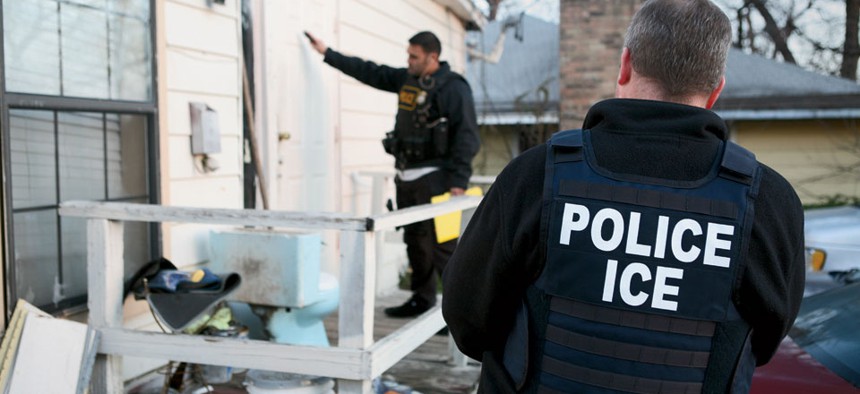
A union official says immigration reform proposals in Congress would make it difficult for ICE agents to do their job. Immigration and Customs Enforcement
Going Off Script
A federal labor leader breaks from his customary role to protest immigration legislation.
Local union chiefs’ responsibilities typically focus on management policies—convening with agency leaders to advocate for higher pay, negotiate better work conditions and limit the impact of budget cuts on employees.
Chris Crane has taken an entirely different approach.
As president of the National Immigration and Customs Enforcement Council—a division of the largest federal employee union, the American Federation of Government Employees—he has taken to the spotlight to speak out against congressional efforts to overhaul the nation’s immigration system.
Crane, also an ICE agent, has testified in front of Congress, appeared on national television programs and engaged an array of stakeholders to explain why—from his perspective, and on behalf of the ICE workers he represents—various immigration reform proposals would have a devastating impact on national security. He has used inflammatory language to spark debate and draw attention to his cause, and he was kicked out of a Senate news conference when the group of lawmakers known as the Gang of Eight unveiled its compromise legislation.
“Lawmaking in our nation has indeed taken a strange twist as senators invite illegal aliens to testify before Congress, and groups representing the interest of illegal aliens are brought in during the development of our nation’s laws. But American citizens working as law enforcement officers are purposely excluded from the process and prohibited from providing input,” Crane told a Senate committee in April.
The ICE Council, which represents about 7,600 employees, was joined by Kenneth Palinkas, president of the National Citizenship and Immigration Services Council, who signed a letter condemning the legislation. “The mission of our federal employees is critical to identifying threats and providing for public safety and national security,” wrote Palinkas, whose organization represents 12,000 federal workers.
He noted the CIS Council was not consulted in crafting the bipartisan immigration legislation, adding that the result was “a bill that makes the current system worse, not better.”
In his congressional testimony, Crane said, “Never before have I seen such contempt for law enforcement officers.”
Despite differences on national policy issues, ICE spokesman Brian P. Hale says the agency will continue its working relationship with the union. “ICE leadership continues to seek to work with AFGE Council 118 union officials and the ICE Council on matters impacting working conditions for ICE employees,” he says.
“That said, this administration has made historic improvements to the integrity of the immigration system through common sense reforms that focus resources on national security and the identification and removal of criminal aliens and other public safety threats,” Hale adds. “Reverting back to a system that treats violent criminals the same as children brought to this country through no fault of their own would only undermine the integrity of the immigration system, force law enforcement agencies to divert limited resources from focusing on those who pose real threats to their communities, and weaken public safety and security.”
Getting involved in political debates is not unusual for unions. Federal employee groups have long pushed lawmakers to vote a certain way on a variety of bills.
AFGE has organized several demonstrations to speak out against the across-the-board budget cuts from sequestration, for example, which directly affect feds through furloughs and hiring freezes. Typically, unions like AFGE find themselves aligning with the left side of the aisle.
Democrats, including Rep. Gerry Connolly and Sen. Mark Warner of Virginia, Reps. Elijah Cummings and Chris Van Hollen of Maryland, and Sen. Tom Carper of Delaware, have long been advocates for public servants.
When union chiefs such as Crane align with senators like Jeff Sessions, R-Ala., who advocates for shrinking government and freezing pay for federal employees, they are entering uncharted territory. Despite his role as a labor leader, Crane has blasted the influence of “big unions” on the immigration debate.
The ICE Council proudly displays its connection to AFGE on its website and letterhead, as well as its parent union, the AFL-CIO. Officials in AFGE’s national office declined requests for comment.
The recent immigration debate is not the first time Crane has bucked union leadership and taken a stand on the national stage. He recently spearheaded a lawsuit against the Obama administration for various executive orders, saying they prohibit ICE workers from properly doing their jobs.
In 2010, Crane led his union to issue a unanimous vote of no confidence in ICE Director John Morton and Assistant Director Phyllis Coven. “It is the desire of our union within ICE and our employees to publicly separate ourselves from the actions of Director Morton and Assistant Director Coven,” Crane wrote in a letter announcing the vote.
For Crane, separating himself seems to be a natural state.
NEXT STORY: Around Government







